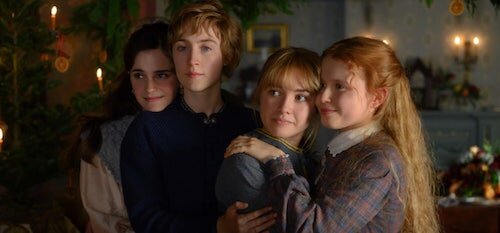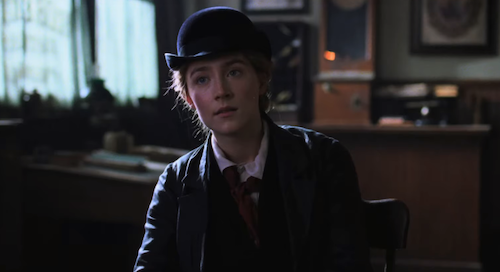Little Women
Most of us already know the classic tale of the March family written by Louisa May Alcott, who essentially was writing about her own family here. You may have studied the novel for class, or just on your own terms. You could have also seen one of the many cinematic or televised adaptations by now. Greta Gerwig clearly wasn’t touching untapped gold here, but it’s obvious that she knew this going in. After Lady Bird introduced the world to Gerwig the director, many of us were champing at the bit to see where she would go next. The umpteenth reiteration of Little Women? While I was still excited, many other voices online weren’t so thrilled. Well, having seen Gerwig’s interpretation, it all makes sense. Look at the parallels between Little Women and Gerwig’s debut feature. These are tales about women growing up in an unforgiving society, with little money to work with, and their familial bonding (especially between the maternal figure) is of utmost importance here. Lady Bird happens to take place in Sacramento with a teenager, and fewer siblings (also no Civil War). Otherwise, the similarities are all there.
So, Gerwig was clearly the expert to take this same old story on one more time. With that, I say that Greta Gerwig should unquestionably win the Best Adapted Screenplay Academy Award this year. The way Gerwig combines both parts to tell a non-chronological story that focuses more on parallels than order is fascinating. It spruces up the same old story in a way that gives new life to the March household. Darker moments hit even harder. The evolution of characters is more apparent, seeing their adult selves beside their imaginative childhoods. The feeling of time slipping through your fingers is even more apparent. Toss in Gerwig’s ability to write instantly hilarious jokes (at times, Little Women felt like a mumblecore comedy in disguise), and you will have a period piece film as infectious as an indie dramedy, and as emotional as one of the great 21st century dramas.
It’s exactly who you would expect: the March sisters!
Little Women also confirms Gerwig’s filmmaking capabilities, as she bounces between past-and-present seamlessly. She balances highs and lows, without getting too dark or too comical; Little Women is as neutrally charming as any other iteration. She absolutely must be talked about in the Best Director Oscar race, and it will be a damn shame if she isn’t nominated. Gerwig is highly capable of pinpointing any emotion, which makes her Little Women so magnetic. All of the turmoils the March siblings have to overcome feel incredibly weighted in this film; this is also thanks to a whimsical-yet-scorching score by Alexandre Desplat. Toss in some acting vets (Meryl Streep, Laura Dern) and fantastic new gen-ers (Saoirse Ronan having made her rounds for ten years, Timothée Chalamet still making a splash, and Florence Pugh as the rising star of 2019), and you have a riveting comedy drama.
Little Women may be a bit of a deviation from your common period piece in terms of feel, but it is completely authentic with its sets and costumes. Gerwig and company were very serious about being authentic to Alcott’s original material, even with the touch ups. If anything, Little Women aspires to be what Alcott may have thought in 2019, had she been able to time travel and see how beloved her tales were one hundred and fifty years later. Gerwig tries to inform newcomers to this material that Alcott didn’t live exactly the life that lead character Jo March had in this novel. She still had her own personal beliefs that deviated from how Jo would respond in textual form. As a result, Gerwig turns Little Women into a somewhat meta experience in the final stretch: an embodiment of Alcott (as Jo March) whilst still taking place within the universe of Little Women. It’s a nice final hurrah that makes 2019’s Little Women necessary in at least one additional, unique way.
Jo March attempts to sell her manuscripts throughout the film.
Even without this final hurrah, Gerwig’s Little Women is unquestionably relevant (with its commentary on a young girl’s place in society, either in the mid 1800’s, or in 2019). It’s fit for any 2019 viewer, even those not into traditional period pieces (although it certainly checks that box off as well). Let’s forget that Little Women has been done to death. This Gerwig film still is a top tier film in an already astounding year. It still is as funny and witty as it is depressing and beautiful. The narrative order is so peculiar, and yet it works based on the ways it compares the March family of yesteryear to the “present”. Now, recall that Little Women has been told in visual form many times. I’d dare say that Greta Gerwig has one of the best versions of this tale, if not the possible best. She not only regurgitates Louisa May Alcott’s original story. She absorbed this novel as a child, reevaluated it as an adult, and represented why this iconic tale is important to her specifically. She explains herself thoroughly, and with the expert detailing of a filmmaker that’s done this many time (careful reminder: this is only her second feature length film as a director and a writer). We get Little Women 2019: a much-needed blast from the past fit to close this year (and this decade) out with pure class and vivid imagination (both fit for a March girl).
Andreas Babiolakis has a Masters degree in Film and Photography Preservation and Collections Management from Ryerson University, as well as a Bachelors degree in Cinema Studies from York University. His favourite times of year are the Criterion Collection flash sales and the annual Toronto International Film Festival.







